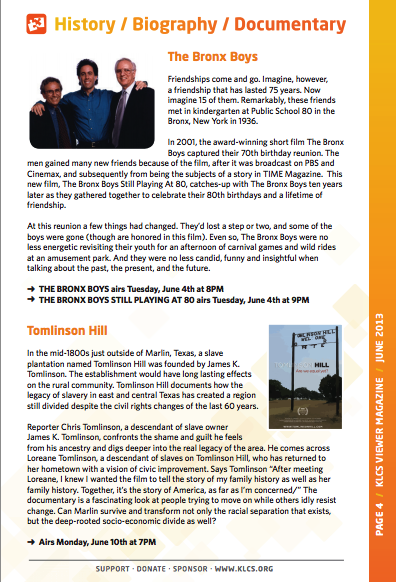Tonight my hometown PBS station, KLRU, will broadcast “Tomlinson Hill” for Juneteenth, the Texas holiday marking the day in 1865 when a Union general ordered the emancipation of Texas slaves. One reason for airing the film on this day is a section of the film where we visit the Marlin Juneteenth parade in 2009.
Our filming that day taught me how little I know about rural, African American life. The community organized a meager, but enthusiastic parade that began at one of the oldest churches on Commerce Street, turned west on Live Oak, the main thoroughfare, and looped in front of the theater and returned to the church. Black men rode horses and motorcycles, women dressed in 19th century dresses and a trailer carried a float depicting a cotton field and a shanty. On the back, a poster read “From the Out House to the White House, Obama!”
Afterward, I attended Juneteenth services and heard amazing sermons about how far African Americans have come since 1865, but more importantly, how the community must work harder to overcome the problems from within, including drug abuse, teenage pregnancy and the high school drop-out rate.
As part of our filming, we stopped and interviewed people on Marlin’s downtown sidewalks about what Juneteenth meant to them. African Americans called it their Fourth of July, the day their ancestors became free. White citizens, though, said the holiday had nothing to do with them; that it was a “black” celebration and it meant nothing to them.
Lisa Kaselak, the director, and I walked down to Friendly Corner, a remnant of Wood Street, a legendary stretch of African American juke joints and cafes razed in the 1990s. Friendly Corner is where a group of black men talk, drink and play dominoes most everyday. I got into a discussion with a man who said that white society still didn’t recognize the historic significance of emancipation. I replied something to the effect of, “You have a holiday for it,” and he immediately called me out.
“It’s not my holiday, or my people’s holiday,” he said. “The problem is people like you don’t see that it should be a holiday for all of us.”
As soon as he said it, I felt ashamed that I, someone who prides himself on cultural awareness, would make such a profound mistake. Juneteenth not only marks the day that the last of the Confederate state slaves gained their freedom, but it was the day that America took a profound step toward living up to its founding principles. Juneteenth marks the moment America reversed its original sin of declaring that white man could own a black man, who counted as only three-fifths of a human. This was a day that I should celebrate as an important step in my nation fulfilling its potential.
Many, many television stations are broadcasting “Tomlinson Hill” tonight, including KLRU here in Austin. I hope that viewers across the country who do not know about Juneteenth will learn more about it, and recognize it not as just a “black holiday” but an important step in our journey to form a more perfect union.
Chris Tomlinson

